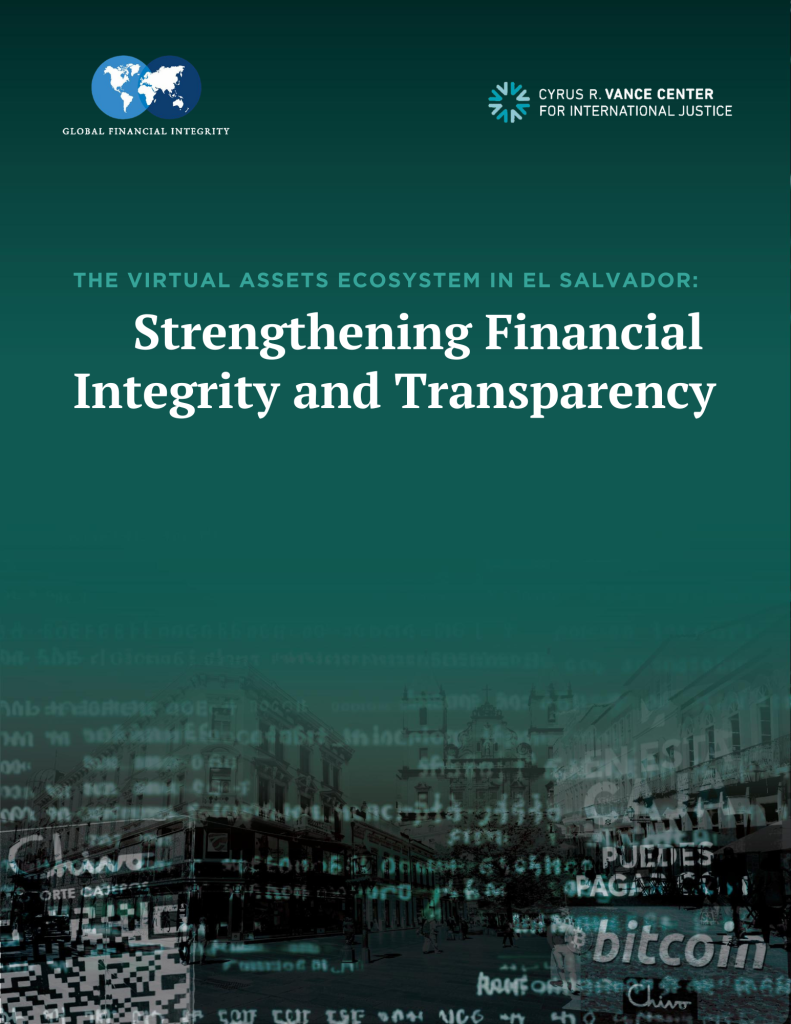This website uses cookies so that we can provide you with the best user experience possible. Cookie information is stored in your browser and performs functions such as recognising you when you return to our website and helping our team to understand which sections of the website you find most interesting and useful.
The Virtual Assets Ecosystem in El Salvador: Strengthening Financial Integrity and Transparency
October 2023
On September 7, 2021, El Salvador became the first country in the world to adopt Bitcoin as legal tender. Two years later, the country has undergone technological change and growth, faced operational and regulatory challenges, and learned a tremendous amount in the process.
This joint publication by the Vance Center and Global Financial Integrity (GFI) analyzes virtual assets (VAs) in El Salvador, first from a legal and regulatory perspective, as well as from an anti-money laundering (AML) and counter-terrorism financing (CFT) perspective. The Vance Center thanks the pro bono firms involved in researching legislation, regulation, and best practices, including Orrick.
The report lays out progress made by El Salvador as well as remaining challenges that need to be addressed. Through a balanced, technical discussion of these issues, the report aims to help El Salvador leverage the benefits of technological and financial innovation while also mitigating risks that may emerge.
The first half of the report analyzes the current regulatory landscape in El Salvador regarding Bitcoin and VAs. El Salvador has taken a major leap in embracing technological innovation, specifically in the digitalization of the financial system, through adopting bitcoin, cryptocurrencies, and digital assets. The country has established a regulatory framework encompassing the Bitcoin Law, the Digital Assets Issuance Law, and the Innovation and Manufacture of Technologies Promotion Law. These laws aim to provide a supportive environment for individuals and businesses engaging in transactions involving digital currencies while fostering innovation and technology manufacturing within the nation.
As a result, El Salvador is poised to become a leading proponent of emerging technologies across various sectors of its economy. Due to the dynamic nature of the subject matter and the ongoing efforts to standardize these frameworks internationally, the report identifies additional areas that may still require regulation.
The second half of the report analyzes VAs in El Salvador from an AML/CFT perspective. The report approaches these issues from the perspective of the Financial Action Task Force (FATF), which states that “the cornerstone (…) is the risk-based approach which emphasizes the need for countries to identify and understand the money laundering (ML) and terrorism financing (TF) risks they are exposed to.”
Understanding risks enables countries such as El Salvador to take mitigating measures and to deploy limited resources effectively. In this regard, the report analyzes financial crime risks for the most common predicate offenses for ML in El Salvador, considering drug trafficking, extortion, migrant smuggling, and misappropriation of public funds (peculado). The report also assesses financial crime risks related to specific operational features or developments within El Salvador’s VA ecosystem.
The report concludes with policy recommendations that can help El Salvador to maximize the benefits and minimize the risks associated with financial innovation. Key recommendations include:
- Policymakers in El Salvador should urgently adopt reforms strengthening AML/CFT as well as ensuring robust oversight over VAs. These reforms are particularly important in light of El Salvador’s upcoming Mutual Evaluation.
- The Government of El Salvador, and specifically the Central Reserve Bank (BCR) and the National Commission of Digital Assets (NCDA), should engage with the legal and business community in developing regulations and technical standards according to need and practice for the Bitcoin Law and Digital Assets Issuance Law, following international best practices.
- Lawyers and law firms advising companies wanting to operate in El Salvador should enhance compliance mechanisms to verify client backgrounds to prevent criminal actors from entering the national financial system.
- All relevant government agencies should ensure transparency and access to public information, including contractual and operational processes, fraud and mismanagement investigations, and the use of public funds, per domestic laws and international standards.
- The BCR should incorporate information on government Bitcoin purchases into the Balance of Payments and other similar documents.
- The Superintendence of the Financial System (SSF) should require that Chivo Wallet collect information on legal persons opening Chivo Wallet accounts in line with the requirements for legal persons to open other types of financial accounts. In addition, Chivo Wallet should maintain beneficial ownership information for legal persons using Chivo Wallet, in line with FATF Recommendation 15’s interpretive guidance and similar to the requirements for financial institutions.
- Considering that financial institutions and other obligated entities submit suspicious transaction reports (STRs) for crypto transactions, the Financial Intelligence Unit (FIU) of El Salvador and other government authorities should provide education and training opportunities to the financial sector and other obligated entities regarding identification of red flag indicators in crypto transactions. This will help to ensure that STRs contain relevant information and reflect an informed understanding of the risks.



